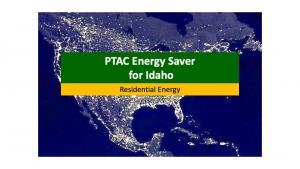
Save 20% or more on HVAC. It’s important now more than ever for a sustainable future!
Optimizing PTAC units with a “smart” device is a fast, easy, and cost-effective way to achieve Residential HVAC Energy Savings. A Packaged Terminal Air Conditioner is a type of self-contained heating and air conditioning system commonly found in: Hotels, Motels, Senior Housing Facilities, Hospitals, Condominiums, Apartment Buildings, and Add-on Rooms & Sunrooms.
Business owners and homeowners face increasing challenges with energy costs to save energy and money in Idaho. PTAC Energy Saver offers an Adaptive Climate Controller (ACC). It is a proven HVAC energy saving device that quickly installs on PTAC units. There are many companies that claim to produce energy savings, but the ACC device is multi-panted and proven over many years. Plus, it has extensive validation tests by organizations such as:
- ConEdison, Manhattan Plaza New York City
- Environmental Test Laboratory, Ohio
- EME Consulting Engineers (Third Party), Sponsored by NYSERDA, New York
- State University of New York, Oneonta, NY
- Tim Garrison (Third Party Testing)
- McQuay Cooling Tests
- Purdue University Tests (Phoenix)
- ConEdison Tests by ERS
Typically, when an HVAC system turns off, shortly after, the blower fan motor turns off. The ACC reprograms the blower fan not to shut off but to throttle back the rpm airflow to an exceptionally low speed, quiescent level airflow or “idle speed”. This allows for a gentle but continuous air movement into the building that helps keep equilibrium of climate conditions in the occupied space and saved energy.
PTAC Energy Saver can help you navigate the complexity of HVAC energy saving choices: CONTACT PTAC Energy Saver
Here is an example of some Residential HVAC Energy Saving info for Idaho:
Idaho Power working to prevent blackouts during heatwave
TWIN FALLS — With high temperatures predicted for the foreseeable future, more people may be inclined to spend time indoors and cool off in an air-conditioned environment. To try and reduce the chances of a power outage, Idaho Power is sharing ways to decrease energy usage.
“These conditions do cause, what I’ll say is scarcity in the energy markets," said Adam Richins, the Chief Operating Officer for Idaho Power. "As there really is less energy and transmission to go around.”
Idaho Power is reporting that from 4:00 pm to 9:00 pm is the time frame for the highest energy consumption and AC usage. To lessen the chances of a possible blackout, they're sharing preventive measures people can take.
“You can turn up your thermostat a few degrees, just to ensure your air conditioning is not working quite so hard," said Richins. "You can close windows and blinds, especially during the late afternoon when the sun is heating up your house or office.”
Idaho Power also recommends leaving lights off when you can and saving other energy-intensive activities, such as laundry, for earlier hours in the day and out of the 4:00 pm to 9:00 pm time frame.
In the event a blackout occurs, Idaho Power is preparing to be as ready as possible.
“We would really make sure to try and communicate with our customers and let them know what’s happening," said Richens. "Typically if you did see rolling blackouts like you’ve seen in California and Texas, it would be for a short amount of time. The power would go out during that time, then we would be bringing it back up as quickly as we could.”
Officials are also asking for people to be prepared in the event of a blackout like having phones charged, and having flashlights and batteries available.
For Twin Falls residents, the city is asking that if an outage happens, do not contact their emergency line and instead contact Idaho Power.
“Please don’t call emergency dispatch, call Idaho Power," said Palmer. "Idaho Power manages all electrical utilities in Twin Falls and in South Central Idaho so, there’s very little the city has on that. However, if there is a life safety event where you feel like your life is in danger. Whether by heat or otherwise, please call our dispatch center.”

